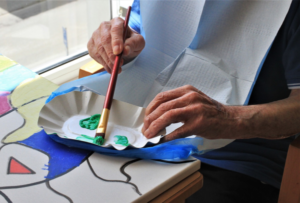How Can You Help Someone With Sundowner’s Syndrome?
Even though you can’t remember me, I promise I will remember the real you.” – Tilicia Hardat
 If you’re like most people, unless you have had experience with it, you’re not aware of Sundowner’s Syndrome, often referred to as “Sundowning” or Late-Day Confusion. This is a syndrome that can affect seniors, but not all, who suffer with dementia or Alzheimer’s.
If you’re like most people, unless you have had experience with it, you’re not aware of Sundowner’s Syndrome, often referred to as “Sundowning” or Late-Day Confusion. This is a syndrome that can affect seniors, but not all, who suffer with dementia or Alzheimer’s.
As you know, symptoms of dementia include:
- mood or behavior changes
- confusion or forgetfulness
- difficulty finding the right words
- difficulty with tasks and activities
- difficulty reasoning
The affects of Sundowners’…
For a person who is Sundowning, their symptoms increase in intensity and new ones may develop in the late afternoon or early evening, and can go well into the night, with the symptoms occurring more regular over time. A Sundowner’s additional symptoms may include: agitation, restlessness, demanding, irritable and suspicious.
While Sundowner’s doesn’t affect every person with dementia or other forms of it, it does affect about one fifth of all those who have Alzheimer’s. Although the cause of Sundowner’s is not yet known, there are some things you can try to help alleviate the symptoms and help with more pleasant evenings.
Tips that may help manage sundowning…
Most important, stay calm and patient, and do not argue about, or correct something your loved one has said that may not be correct. First of all, it’s not important, and all you will do is agitate them even more. Rather, either try to validate them or gently change the subject, or distract them.
These ideas may help you have more peaceful evenings with your love one;
 Try to engage them in relaxing activities as the day turns into late afternoon.
Try to engage them in relaxing activities as the day turns into late afternoon.- Take them for pleasant evening walks.
- Have, and stick to as much as possible, daily routines that are natural and comfortable for your loved one, having regular bedtime and meal times.
- Limit screen time and avoid shows that are violent or aggressive.
- Create a relaxing atmosphere, play soothing music later in the day and burn fragrant candles.
- Try to keep loud noises to an extreme minimum…turn the TV down, or phone ringers on vibrate.
- Be sure their living space is well lit, but not too dark or too bright. Expose them to as much natural light as possible. Nightlights in the bedroom are always reassuring.
- Avoid caffeine drinks or other stimulants during the late afternoon or evening.
- Be reassuring when they are frightened or confused.
 Having a loving pet to cuddle with is always reassuring.
Having a loving pet to cuddle with is always reassuring.- Keep them safe, by having good locks on the windows and doors, block any stairways with a gate, and be sure that all sharp tools or kitchen utensils are put away.
- You may feel more reassured if you have a baby monitor in their room so you can “check in” without being too obvious.
These ideas may not all work well for you, but experiment with them and other calming things to find out how you can help your loved one.
We are Certified Senior Move Managers recognized by our National Association of Senior Move Managers, NASMM! We are committed to serving our seniors with a high standard of ethics, best business practices and continuing education to help make whatever transition they are going through a Smooth Transition.
Contact us to learn how we can help you and/or your family with senior downsizing and moving anywhere in the Phoenix East Valley area…we offer a Free consultation.
We would love to serve you. 480-339-0011

Comments are closed.